Breaking the link between school exclusions and knife crime

The All-Party Parliamentary Group (APPG) on Knife Crime is a group of over 40 MPs and Peers, set up in response to the alarming rise in knife crime across the country. The group aims to develop cross-party consensus from parliamentarians around new approaches to tackling knife crime, with particular focus on prevention and early intervention.
Today (25 Oct) the APPG on Knife Crime has released their latest report “Back to School? Breaking the link between school exclusions and knife crime”.
School exclusions have been increasing at an alarming rate. Huge proportions of excluded children have special educational needs and other, often unaddressed, vulnerabilities.
In many cases there is literally nowhere for them to go. All children must have access to the high-quality full-time education that gives them the best chances in life, to stay away from harm and go on to achieve their potential.
It’s a travesty that so many children are being locked out of education and the opportunities that come with it. Schools have a vital role to play in the effort to prevent and tackle serious youth violence. Excluding a child must be a last resort.
But too often we are hearing of schools struggling to find resources to support children and manage their behaviour, or being too hasty to exclude a child for minor misbehaviour. Too many children are being socially excluded and marked as failures, with tragic consequences.
All too often the moment of school exclusion is the tipping point that leads to young people picking up knives. It’s increasingly clear children outside of mainstream schools are at serious risk of grooming and exploitation by criminal gangs. Professionals talk of the ‘pupil referral units (PRU) to prison pipeline’. We must act now to stop the flow.
This document summarises our findings from meetings and independent research, and makes a number of recommendations.
We need to help schools reduce the numbers of exclusions, improve the quality and availability of alternative provision, and break the link between exclusion and crime once and for all.
Knife crime tragically continues to take children’s lives. We can cure this epidemic of violence if we start from the principle that no child is left behind.
The All-Party Parliamentary Group (APPG) set out to establish the role school exclusions may be playing in exacerbating the increase in knife crime; and what could be done to support vulnerable young people both before and after exclusion to help ensure we could keep them safe.
The inquiry involved:
- A public meeting involving young people who had been excluded, their parents, educational professionals, academics and other interested stakeholders
- A roundtable with policy experts and providers of mainstream and alternative provision; and
- A Freedom of Information (FOI) request to all local authorities to establish capacity in alternative provision in their area.
The aim was to answer four main questions:
- What is driving the current rise in school exclusions?
- Is there a link between rising school exclusions and rising levels of knife crime?
- What can be done to prevent exclusion from mainstream education, particularly of young people who may be at risk of involvement in serious violence?
- What happens to young people when they are excluded from school? How do we effectively safeguard them and ensure they access effective education?
This paper provides a summary of findings. It also provides a range of practical recommendations which the Government should implement to help combat the problem and keep vulnerable children and young people safe.
Sector Response
A Government spokesperson said:
“The Government has been clear that it will always back teachers and headteachers in delivering discipline in the classroom. The issues surrounding knife crime and poor behaviour in schools are complicated and multi-faceted. Simple causal links between exclusions and crime cannot be drawn.
“We are clear that permanent exclusion should only be used as a last resort and exclusion from school must not mean exclusion from education. Furthermore, we must be just as ambitious for young people in alternative provision as we are for those in mainstream schools, and we are taking a range of actions to drive up the quality of those settings.
“The Education Secretary is clear that reforming alternative provision is one of his key priorities and we are taking a range of actions to drive up quality in those settings, including building on the best practice that the Secretary of State has seen in a number of recent visits to schools like Everton Free School.
“Knife crime and serious violence are complicated issues, which is why we are working with the education sector, the Home Office and other Government Departments as part of a comprehensive multi-agency response.
“Schools should be safe and disciplined environments for both pupils and teachers. We recently announced a £10 million investment to establish behaviour hubs so that schools with a track record of effectively managing pupils’ behaviour can share what works with schools that need it.
“Headteachers and school management teams are best placed to make decisions about how to manage the risks associated with knives and weapons in schools. A knife wand or arch can be part of an effective response to an identified risk and can help prevent knives or other weapons being brought into schools.
“We have strengthened teachers’ powers so they can take action if they suspect a pupil has brought a prohibited item, including knives, into schools. These powers include searching pupils or their possessions – or requiring them to undergo screening by a walk-through or hand-held metal detector – if they suspect they have a weapon.
“We have already launched a £4 million AP Innovation Fund which is delivering projects to improve outcomes for children in AP.
“Overall provision arranged for a child must be full-time, unless this would not be in the child’s best interests because of health needs. Guidance reinforces that the education received in AP should be on a par with that which a child would receive in a mainstream school. Full time can be made up of two or more part time provisions. For example, a pupil may spend the majority of time in mainstream but attend an AP setting for smaller, defined periods of time to supplement their education.
“Part-time AP settings may be commissioned for a variety of reasons, including to equip children with vocational skills working with specialists. AP settings are only required to register with DfE if they meet the minimum threshold for registration as an independent school.
“The Department’s guidance is clear that the local authority or school acting as the AP commissioner must assure themselves that the setting is registered where appropriate and provision is delivered by high quality staff with suitable safeguarding checks.”











Responses